A Comparative Analysis: Hydro Power and Nuclear Fission Energy Sources
VerifiedAdded on 2020/10/04
|15
|3676
|88
Report
AI Summary
This report provides a comparative analysis of hydro power and nuclear fission as energy sources. It begins with an introduction outlining the classification of energy sources into renewable and non-renewable categories, focusing on electricity generation. The main body delves into the background of both hydro power and nuclear fission, discussing their operational mechanisms, advantages, and disadvantages. Hydro power's benefits include its renewable nature and low operational costs, while nuclear fission is valued for its high energy output. The report then presents the results and discussion, including cost comparisons, production expenses, and environmental impacts. It highlights the efficiency of hydro power, especially in regions with abundant water resources, and the role of nuclear power in various countries. The report also examines the economic aspects of nuclear power, including capital costs, operational expenses, and external costs. The discussion section further elaborates on the costs and benefits of hydro power, emphasizing its renewable nature and the importance of considering water availability for implementation. The report concludes by synthesizing the findings and offering insights into the future of these energy sources.
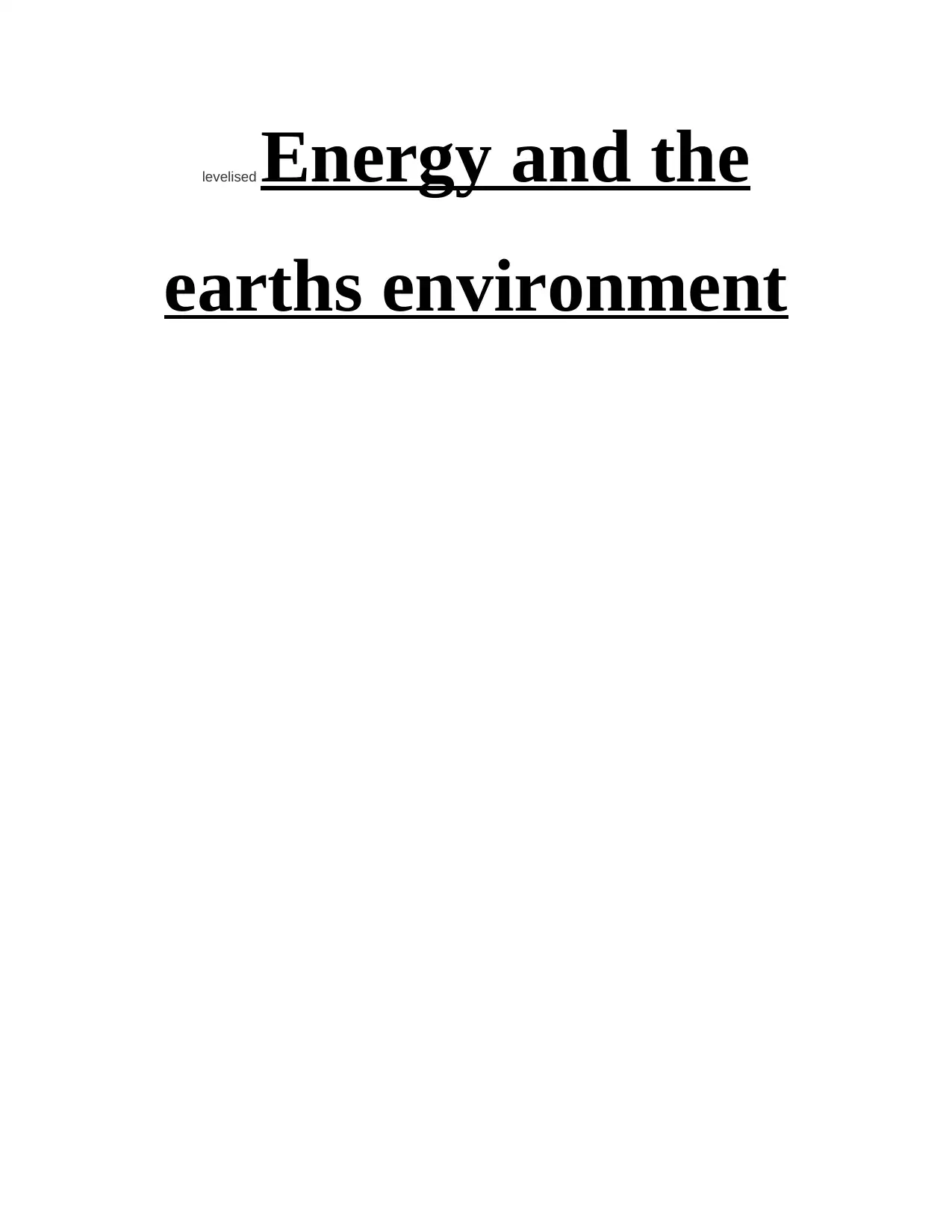
levelised Energy and the
earths environment
earths environment
Paraphrase This Document
Need a fresh take? Get an instant paraphrase of this document with our AI Paraphraser
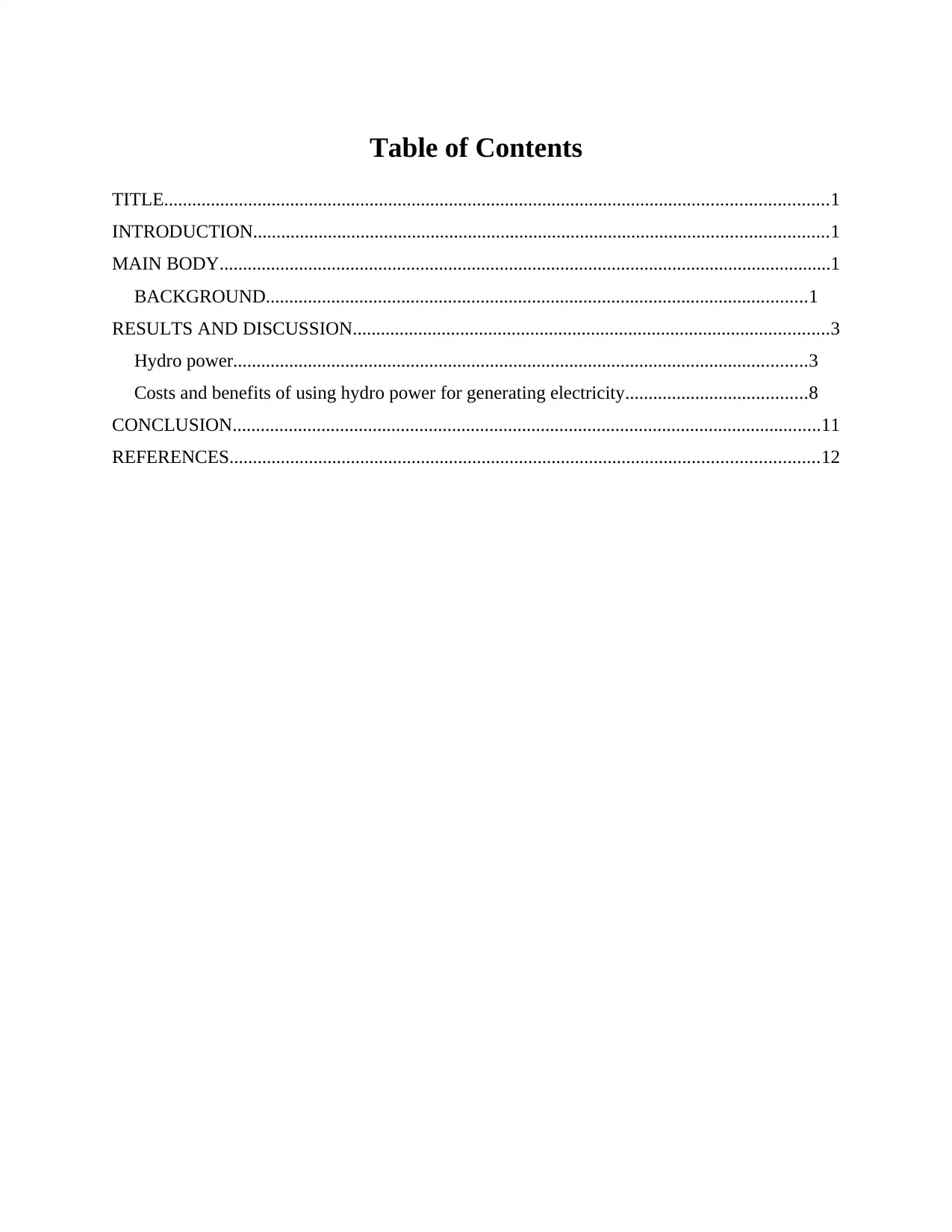
Table of Contents
TITLE..............................................................................................................................................1
INTRODUCTION...........................................................................................................................1
MAIN BODY...................................................................................................................................1
BACKGROUND....................................................................................................................1
RESULTS AND DISCUSSION......................................................................................................3
Hydro power...........................................................................................................................3
Costs and benefits of using hydro power for generating electricity.......................................8
CONCLUSION..............................................................................................................................11
REFERENCES..............................................................................................................................12
TITLE..............................................................................................................................................1
INTRODUCTION...........................................................................................................................1
MAIN BODY...................................................................................................................................1
BACKGROUND....................................................................................................................1
RESULTS AND DISCUSSION......................................................................................................3
Hydro power...........................................................................................................................3
Costs and benefits of using hydro power for generating electricity.......................................8
CONCLUSION..............................................................................................................................11
REFERENCES..............................................................................................................................12
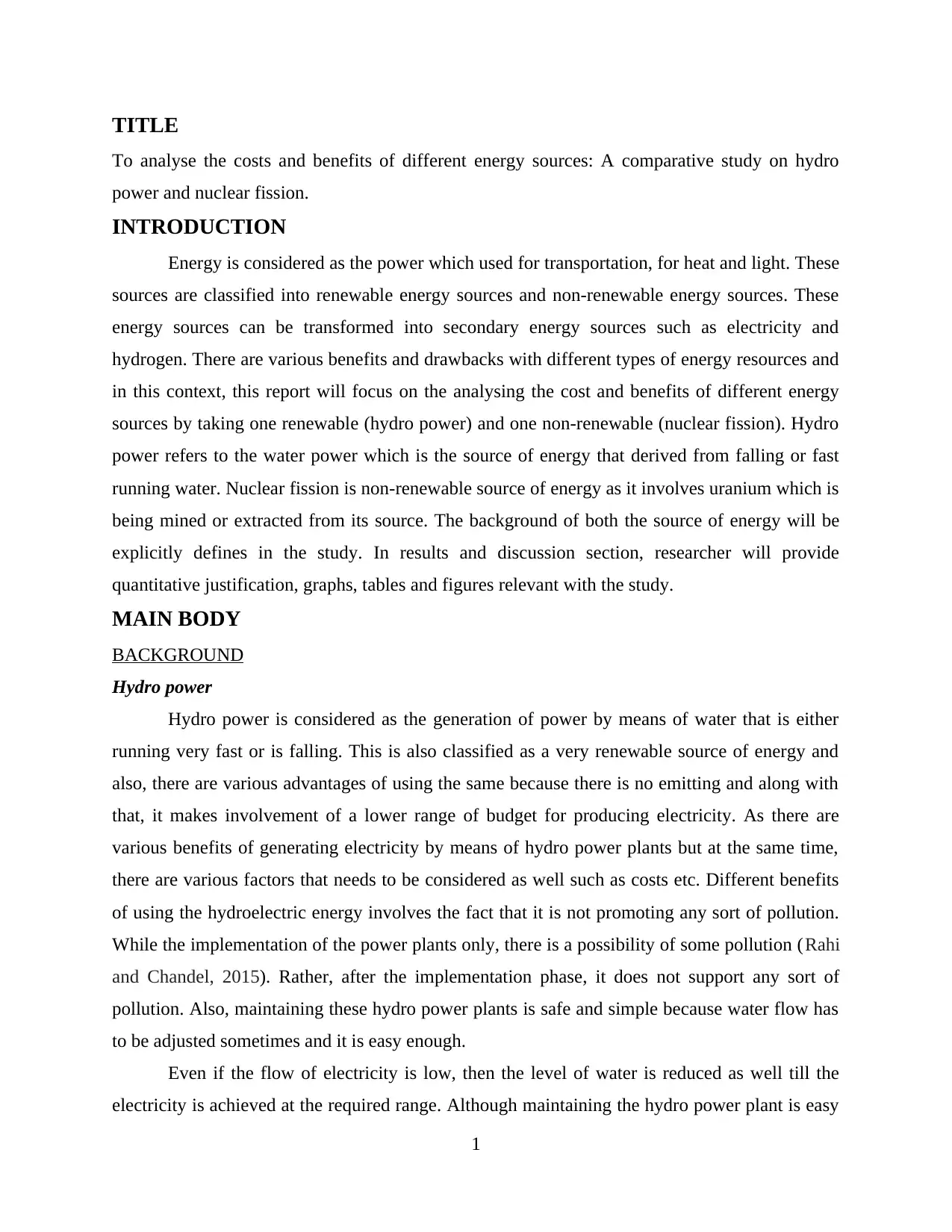
TITLE
To analyse the costs and benefits of different energy sources: A comparative study on hydro
power and nuclear fission.
INTRODUCTION
Energy is considered as the power which used for transportation, for heat and light. These
sources are classified into renewable energy sources and non-renewable energy sources. These
energy sources can be transformed into secondary energy sources such as electricity and
hydrogen. There are various benefits and drawbacks with different types of energy resources and
in this context, this report will focus on the analysing the cost and benefits of different energy
sources by taking one renewable (hydro power) and one non-renewable (nuclear fission). Hydro
power refers to the water power which is the source of energy that derived from falling or fast
running water. Nuclear fission is non-renewable source of energy as it involves uranium which is
being mined or extracted from its source. The background of both the source of energy will be
explicitly defines in the study. In results and discussion section, researcher will provide
quantitative justification, graphs, tables and figures relevant with the study.
MAIN BODY
BACKGROUND
Hydro power
Hydro power is considered as the generation of power by means of water that is either
running very fast or is falling. This is also classified as a very renewable source of energy and
also, there are various advantages of using the same because there is no emitting and along with
that, it makes involvement of a lower range of budget for producing electricity. As there are
various benefits of generating electricity by means of hydro power plants but at the same time,
there are various factors that needs to be considered as well such as costs etc. Different benefits
of using the hydroelectric energy involves the fact that it is not promoting any sort of pollution.
While the implementation of the power plants only, there is a possibility of some pollution (Rahi
and Chandel, 2015). Rather, after the implementation phase, it does not support any sort of
pollution. Also, maintaining these hydro power plants is safe and simple because water flow has
to be adjusted sometimes and it is easy enough.
Even if the flow of electricity is low, then the level of water is reduced as well till the
electricity is achieved at the required range. Although maintaining the hydro power plant is easy
1
To analyse the costs and benefits of different energy sources: A comparative study on hydro
power and nuclear fission.
INTRODUCTION
Energy is considered as the power which used for transportation, for heat and light. These
sources are classified into renewable energy sources and non-renewable energy sources. These
energy sources can be transformed into secondary energy sources such as electricity and
hydrogen. There are various benefits and drawbacks with different types of energy resources and
in this context, this report will focus on the analysing the cost and benefits of different energy
sources by taking one renewable (hydro power) and one non-renewable (nuclear fission). Hydro
power refers to the water power which is the source of energy that derived from falling or fast
running water. Nuclear fission is non-renewable source of energy as it involves uranium which is
being mined or extracted from its source. The background of both the source of energy will be
explicitly defines in the study. In results and discussion section, researcher will provide
quantitative justification, graphs, tables and figures relevant with the study.
MAIN BODY
BACKGROUND
Hydro power
Hydro power is considered as the generation of power by means of water that is either
running very fast or is falling. This is also classified as a very renewable source of energy and
also, there are various advantages of using the same because there is no emitting and along with
that, it makes involvement of a lower range of budget for producing electricity. As there are
various benefits of generating electricity by means of hydro power plants but at the same time,
there are various factors that needs to be considered as well such as costs etc. Different benefits
of using the hydroelectric energy involves the fact that it is not promoting any sort of pollution.
While the implementation of the power plants only, there is a possibility of some pollution (Rahi
and Chandel, 2015). Rather, after the implementation phase, it does not support any sort of
pollution. Also, maintaining these hydro power plants is safe and simple because water flow has
to be adjusted sometimes and it is easy enough.
Even if the flow of electricity is low, then the level of water is reduced as well till the
electricity is achieved at the required range. Although maintaining the hydro power plant is easy
1
⊘ This is a preview!⊘
Do you want full access?
Subscribe today to unlock all pages.

Trusted by 1+ million students worldwide
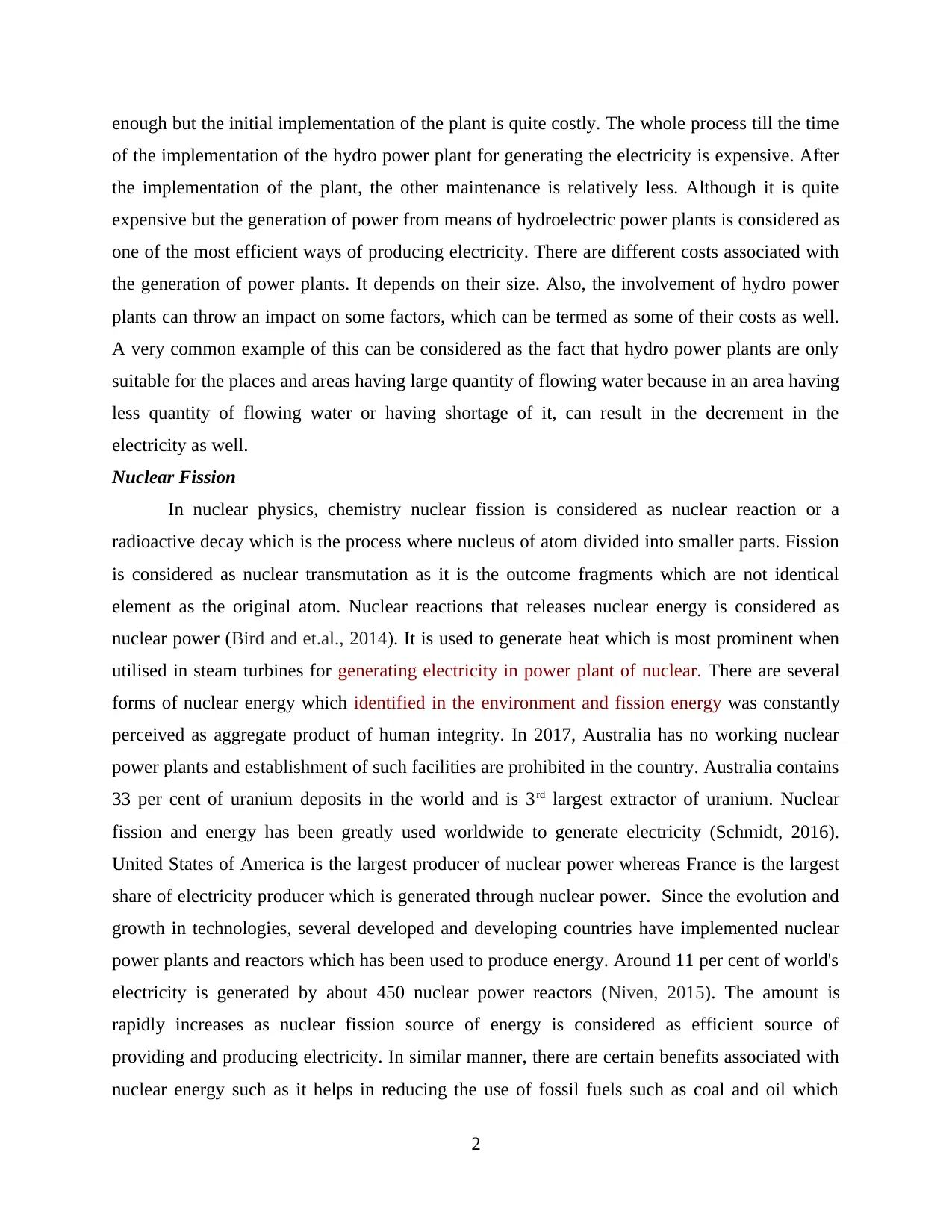
enough but the initial implementation of the plant is quite costly. The whole process till the time
of the implementation of the hydro power plant for generating the electricity is expensive. After
the implementation of the plant, the other maintenance is relatively less. Although it is quite
expensive but the generation of power from means of hydroelectric power plants is considered as
one of the most efficient ways of producing electricity. There are different costs associated with
the generation of power plants. It depends on their size. Also, the involvement of hydro power
plants can throw an impact on some factors, which can be termed as some of their costs as well.
A very common example of this can be considered as the fact that hydro power plants are only
suitable for the places and areas having large quantity of flowing water because in an area having
less quantity of flowing water or having shortage of it, can result in the decrement in the
electricity as well.
Nuclear Fission
In nuclear physics, chemistry nuclear fission is considered as nuclear reaction or a
radioactive decay which is the process where nucleus of atom divided into smaller parts. Fission
is considered as nuclear transmutation as it is the outcome fragments which are not identical
element as the original atom. Nuclear reactions that releases nuclear energy is considered as
nuclear power (Bird and et.al., 2014). It is used to generate heat which is most prominent when
utilised in steam turbines for generating electricity in power plant of nuclear. There are several
forms of nuclear energy which identified in the environment and fission energy was constantly
perceived as aggregate product of human integrity. In 2017, Australia has no working nuclear
power plants and establishment of such facilities are prohibited in the country. Australia contains
33 per cent of uranium deposits in the world and is 3rd largest extractor of uranium. Nuclear
fission and energy has been greatly used worldwide to generate electricity (Schmidt, 2016).
United States of America is the largest producer of nuclear power whereas France is the largest
share of electricity producer which is generated through nuclear power. Since the evolution and
growth in technologies, several developed and developing countries have implemented nuclear
power plants and reactors which has been used to produce energy. Around 11 per cent of world's
electricity is generated by about 450 nuclear power reactors (Niven, 2015). The amount is
rapidly increases as nuclear fission source of energy is considered as efficient source of
providing and producing electricity. In similar manner, there are certain benefits associated with
nuclear energy such as it helps in reducing the use of fossil fuels such as coal and oil which
2
of the implementation of the hydro power plant for generating the electricity is expensive. After
the implementation of the plant, the other maintenance is relatively less. Although it is quite
expensive but the generation of power from means of hydroelectric power plants is considered as
one of the most efficient ways of producing electricity. There are different costs associated with
the generation of power plants. It depends on their size. Also, the involvement of hydro power
plants can throw an impact on some factors, which can be termed as some of their costs as well.
A very common example of this can be considered as the fact that hydro power plants are only
suitable for the places and areas having large quantity of flowing water because in an area having
less quantity of flowing water or having shortage of it, can result in the decrement in the
electricity as well.
Nuclear Fission
In nuclear physics, chemistry nuclear fission is considered as nuclear reaction or a
radioactive decay which is the process where nucleus of atom divided into smaller parts. Fission
is considered as nuclear transmutation as it is the outcome fragments which are not identical
element as the original atom. Nuclear reactions that releases nuclear energy is considered as
nuclear power (Bird and et.al., 2014). It is used to generate heat which is most prominent when
utilised in steam turbines for generating electricity in power plant of nuclear. There are several
forms of nuclear energy which identified in the environment and fission energy was constantly
perceived as aggregate product of human integrity. In 2017, Australia has no working nuclear
power plants and establishment of such facilities are prohibited in the country. Australia contains
33 per cent of uranium deposits in the world and is 3rd largest extractor of uranium. Nuclear
fission and energy has been greatly used worldwide to generate electricity (Schmidt, 2016).
United States of America is the largest producer of nuclear power whereas France is the largest
share of electricity producer which is generated through nuclear power. Since the evolution and
growth in technologies, several developed and developing countries have implemented nuclear
power plants and reactors which has been used to produce energy. Around 11 per cent of world's
electricity is generated by about 450 nuclear power reactors (Niven, 2015). The amount is
rapidly increases as nuclear fission source of energy is considered as efficient source of
providing and producing electricity. In similar manner, there are certain benefits associated with
nuclear energy such as it helps in reducing the use of fossil fuels such as coal and oil which
2
Paraphrase This Document
Need a fresh take? Get an instant paraphrase of this document with our AI Paraphraser
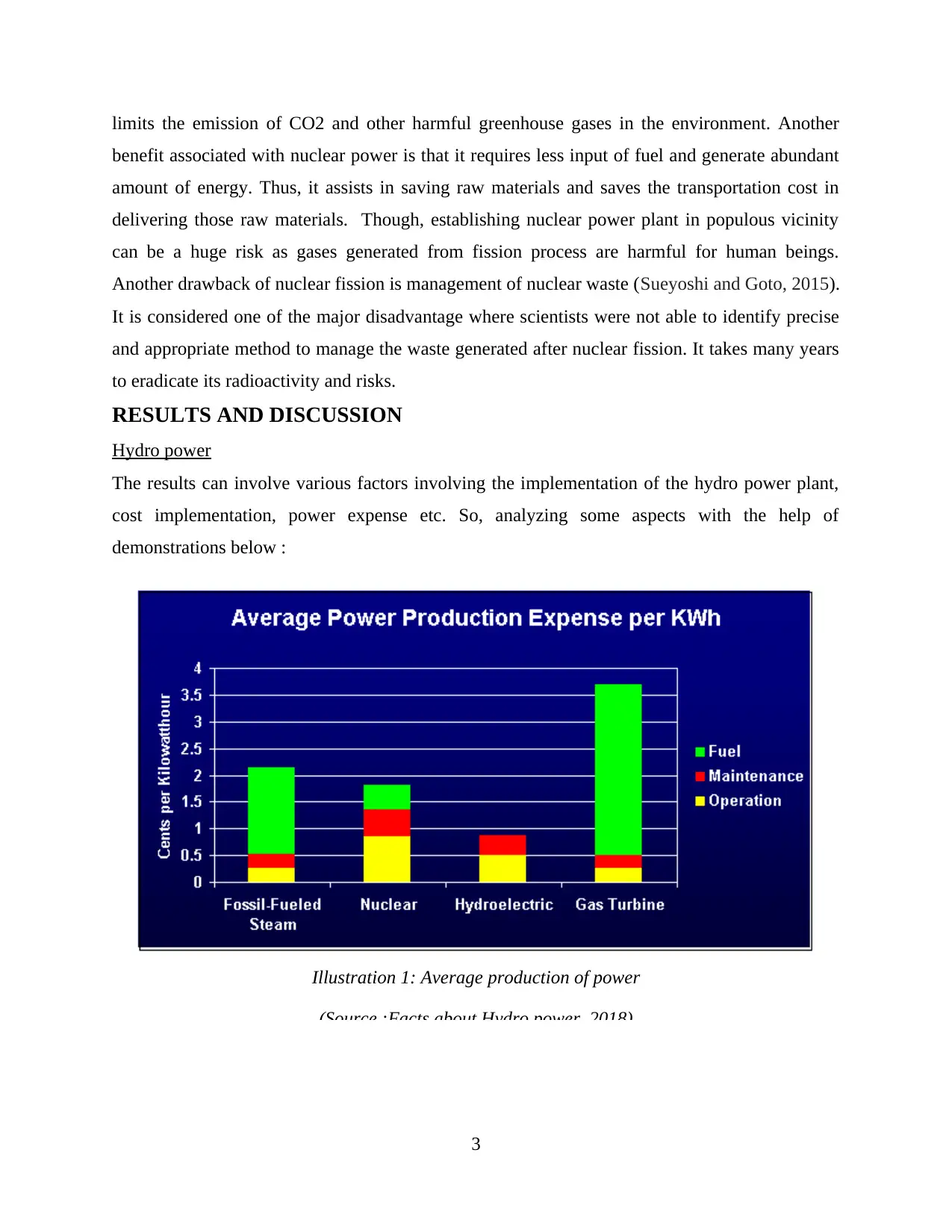
limits the emission of CO2 and other harmful greenhouse gases in the environment. Another
benefit associated with nuclear power is that it requires less input of fuel and generate abundant
amount of energy. Thus, it assists in saving raw materials and saves the transportation cost in
delivering those raw materials. Though, establishing nuclear power plant in populous vicinity
can be a huge risk as gases generated from fission process are harmful for human beings.
Another drawback of nuclear fission is management of nuclear waste (Sueyoshi and Goto, 2015).
It is considered one of the major disadvantage where scientists were not able to identify precise
and appropriate method to manage the waste generated after nuclear fission. It takes many years
to eradicate its radioactivity and risks.
RESULTS AND DISCUSSION
Hydro power
The results can involve various factors involving the implementation of the hydro power plant,
cost implementation, power expense etc. So, analyzing some aspects with the help of
demonstrations below :
3
Illustration 1: Average production of power
(Source :Facts about Hydro power, 2018)
benefit associated with nuclear power is that it requires less input of fuel and generate abundant
amount of energy. Thus, it assists in saving raw materials and saves the transportation cost in
delivering those raw materials. Though, establishing nuclear power plant in populous vicinity
can be a huge risk as gases generated from fission process are harmful for human beings.
Another drawback of nuclear fission is management of nuclear waste (Sueyoshi and Goto, 2015).
It is considered one of the major disadvantage where scientists were not able to identify precise
and appropriate method to manage the waste generated after nuclear fission. It takes many years
to eradicate its radioactivity and risks.
RESULTS AND DISCUSSION
Hydro power
The results can involve various factors involving the implementation of the hydro power plant,
cost implementation, power expense etc. So, analyzing some aspects with the help of
demonstrations below :
3
Illustration 1: Average production of power
(Source :Facts about Hydro power, 2018)
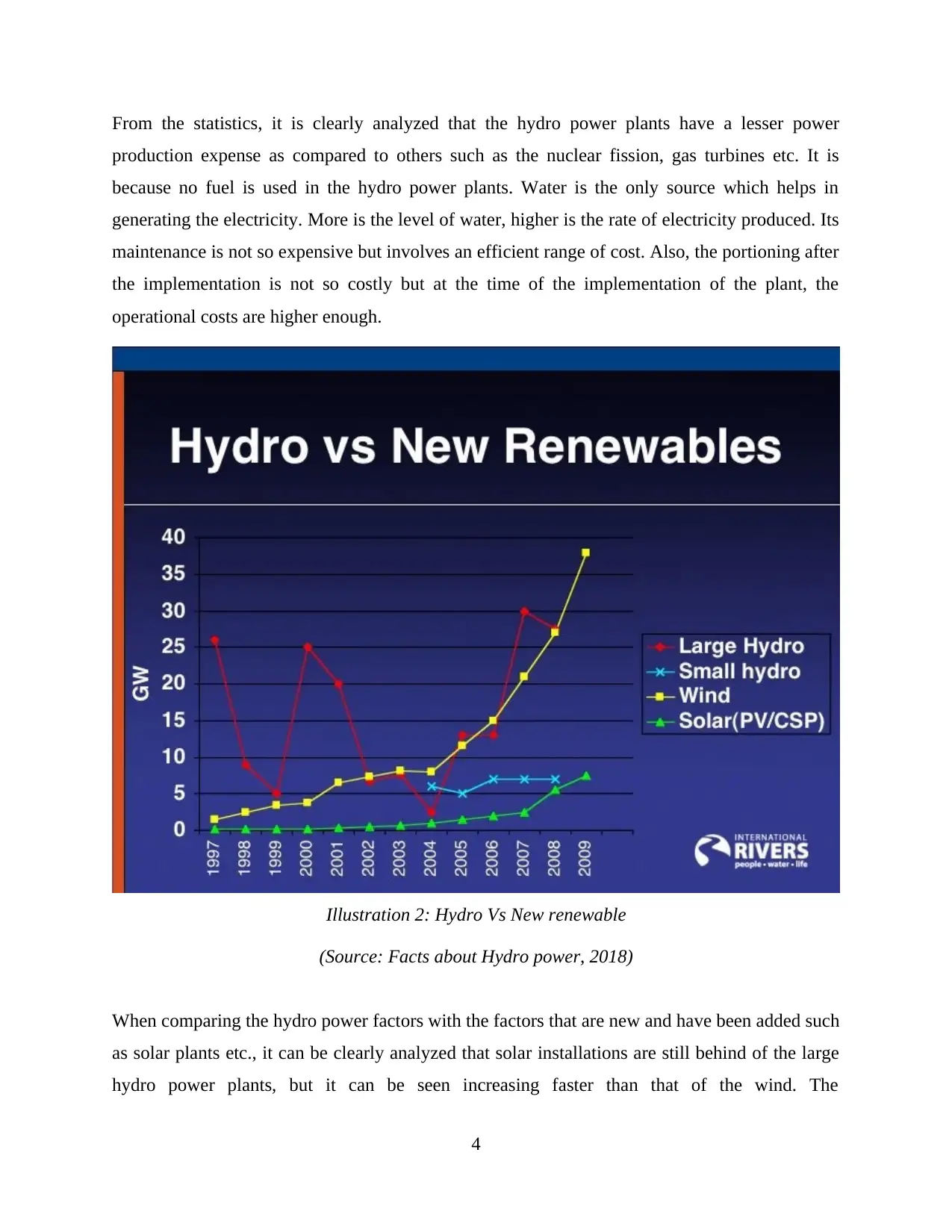
From the statistics, it is clearly analyzed that the hydro power plants have a lesser power
production expense as compared to others such as the nuclear fission, gas turbines etc. It is
because no fuel is used in the hydro power plants. Water is the only source which helps in
generating the electricity. More is the level of water, higher is the rate of electricity produced. Its
maintenance is not so expensive but involves an efficient range of cost. Also, the portioning after
the implementation is not so costly but at the time of the implementation of the plant, the
operational costs are higher enough.
When comparing the hydro power factors with the factors that are new and have been added such
as solar plants etc., it can be clearly analyzed that solar installations are still behind of the large
hydro power plants, but it can be seen increasing faster than that of the wind. The
4
Illustration 2: Hydro Vs New renewable
(Source: Facts about Hydro power, 2018)
production expense as compared to others such as the nuclear fission, gas turbines etc. It is
because no fuel is used in the hydro power plants. Water is the only source which helps in
generating the electricity. More is the level of water, higher is the rate of electricity produced. Its
maintenance is not so expensive but involves an efficient range of cost. Also, the portioning after
the implementation is not so costly but at the time of the implementation of the plant, the
operational costs are higher enough.
When comparing the hydro power factors with the factors that are new and have been added such
as solar plants etc., it can be clearly analyzed that solar installations are still behind of the large
hydro power plants, but it can be seen increasing faster than that of the wind. The
4
Illustration 2: Hydro Vs New renewable
(Source: Facts about Hydro power, 2018)
⊘ This is a preview!⊘
Do you want full access?
Subscribe today to unlock all pages.

Trusted by 1+ million students worldwide
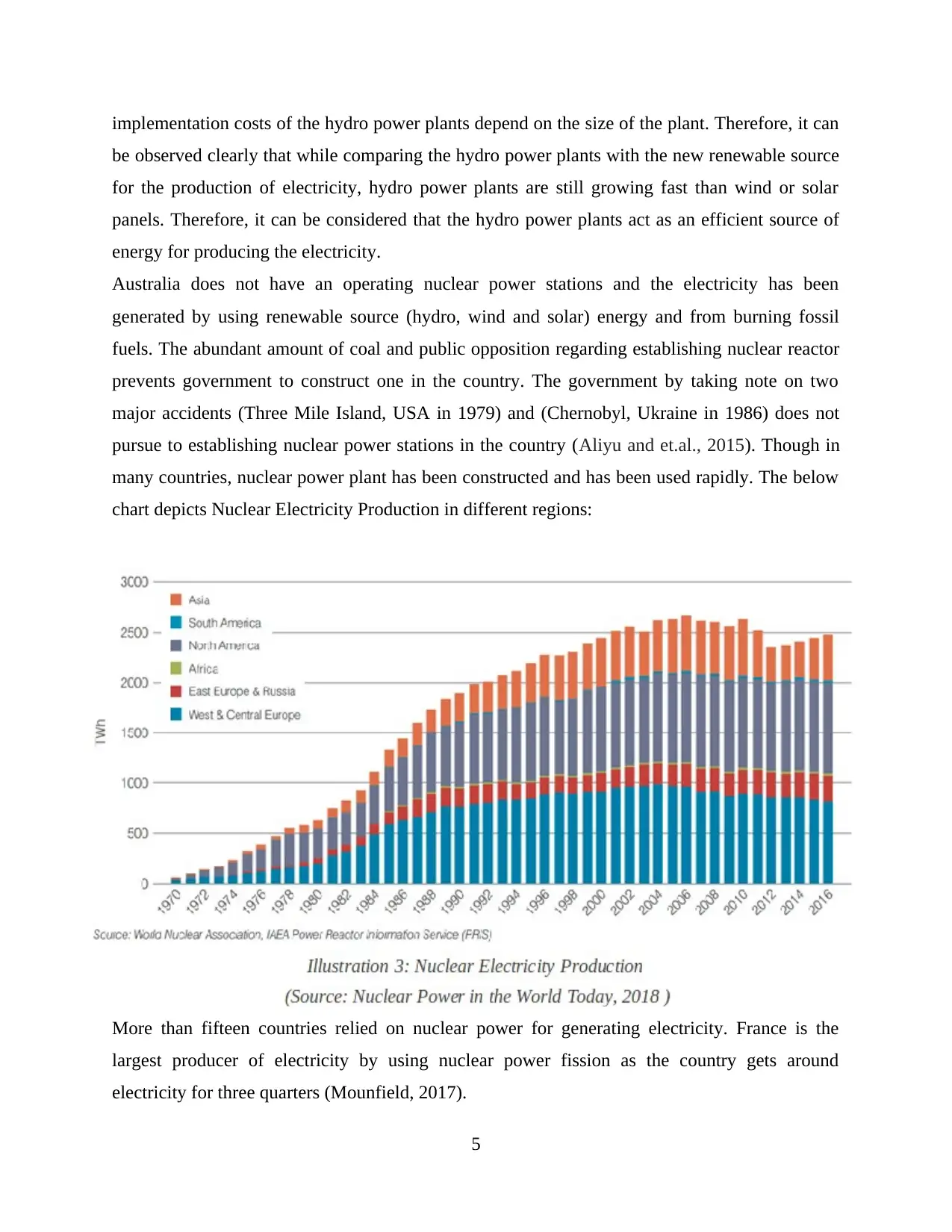
implementation costs of the hydro power plants depend on the size of the plant. Therefore, it can
be observed clearly that while comparing the hydro power plants with the new renewable source
for the production of electricity, hydro power plants are still growing fast than wind or solar
panels. Therefore, it can be considered that the hydro power plants act as an efficient source of
energy for producing the electricity.
Australia does not have an operating nuclear power stations and the electricity has been
generated by using renewable source (hydro, wind and solar) energy and from burning fossil
fuels. The abundant amount of coal and public opposition regarding establishing nuclear reactor
prevents government to construct one in the country. The government by taking note on two
major accidents (Three Mile Island, USA in 1979) and (Chernobyl, Ukraine in 1986) does not
pursue to establishing nuclear power stations in the country (Aliyu and et.al., 2015). Though in
many countries, nuclear power plant has been constructed and has been used rapidly. The below
chart depicts Nuclear Electricity Production in different regions:
More than fifteen countries relied on nuclear power for generating electricity. France is the
largest producer of electricity by using nuclear power fission as the country gets around
electricity for three quarters (Mounfield, 2017).
5
be observed clearly that while comparing the hydro power plants with the new renewable source
for the production of electricity, hydro power plants are still growing fast than wind or solar
panels. Therefore, it can be considered that the hydro power plants act as an efficient source of
energy for producing the electricity.
Australia does not have an operating nuclear power stations and the electricity has been
generated by using renewable source (hydro, wind and solar) energy and from burning fossil
fuels. The abundant amount of coal and public opposition regarding establishing nuclear reactor
prevents government to construct one in the country. The government by taking note on two
major accidents (Three Mile Island, USA in 1979) and (Chernobyl, Ukraine in 1986) does not
pursue to establishing nuclear power stations in the country (Aliyu and et.al., 2015). Though in
many countries, nuclear power plant has been constructed and has been used rapidly. The below
chart depicts Nuclear Electricity Production in different regions:
More than fifteen countries relied on nuclear power for generating electricity. France is the
largest producer of electricity by using nuclear power fission as the country gets around
electricity for three quarters (Mounfield, 2017).
5
Paraphrase This Document
Need a fresh take? Get an instant paraphrase of this document with our AI Paraphraser
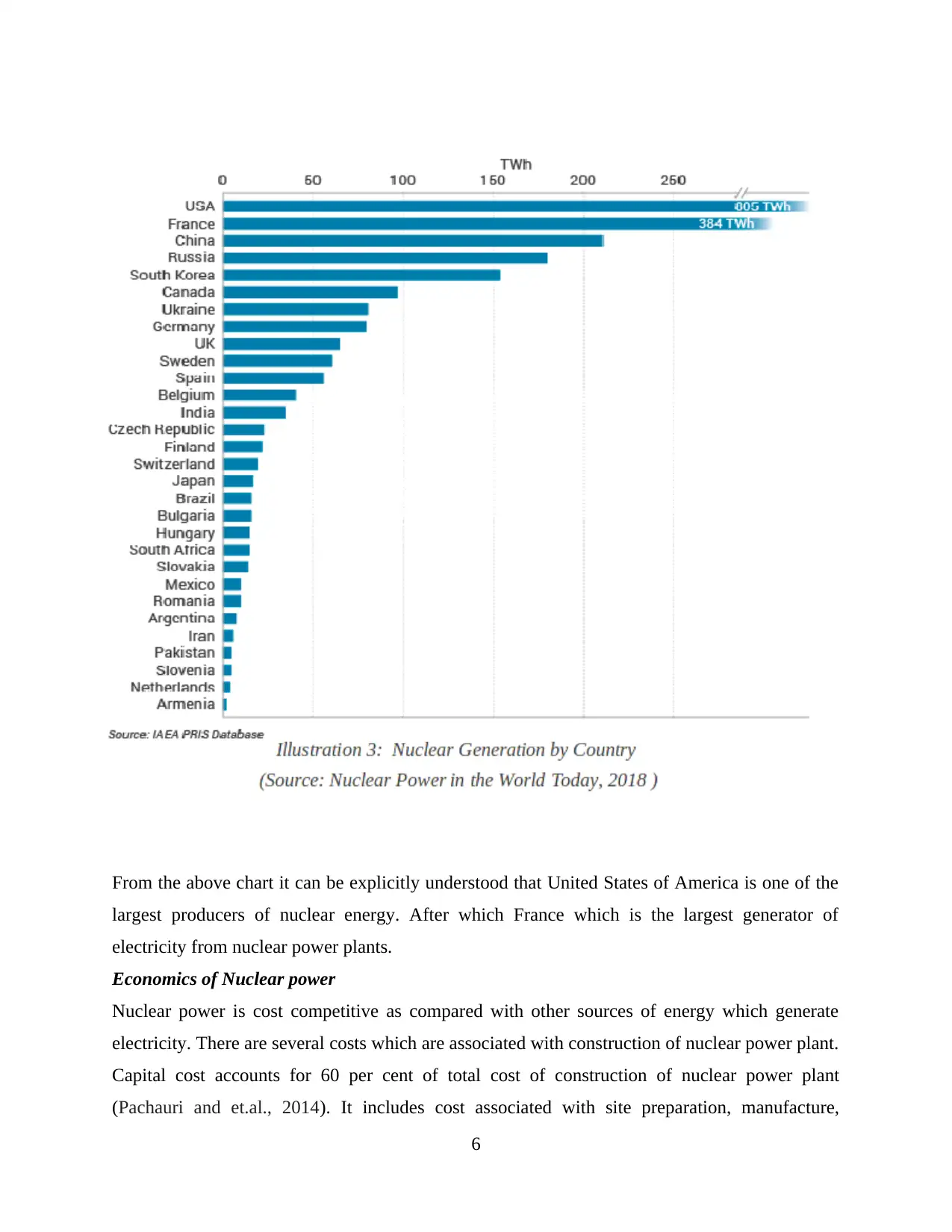
From the above chart it can be explicitly understood that United States of America is one of the
largest producers of nuclear energy. After which France which is the largest generator of
electricity from nuclear power plants.
Economics of Nuclear power
Nuclear power is cost competitive as compared with other sources of energy which generate
electricity. There are several costs which are associated with construction of nuclear power plant.
Capital cost accounts for 60 per cent of total cost of construction of nuclear power plant
(Pachauri and et.al., 2014). It includes cost associated with site preparation, manufacture,
6
largest producers of nuclear energy. After which France which is the largest generator of
electricity from nuclear power plants.
Economics of Nuclear power
Nuclear power is cost competitive as compared with other sources of energy which generate
electricity. There are several costs which are associated with construction of nuclear power plant.
Capital cost accounts for 60 per cent of total cost of construction of nuclear power plant
(Pachauri and et.al., 2014). It includes cost associated with site preparation, manufacture,
6
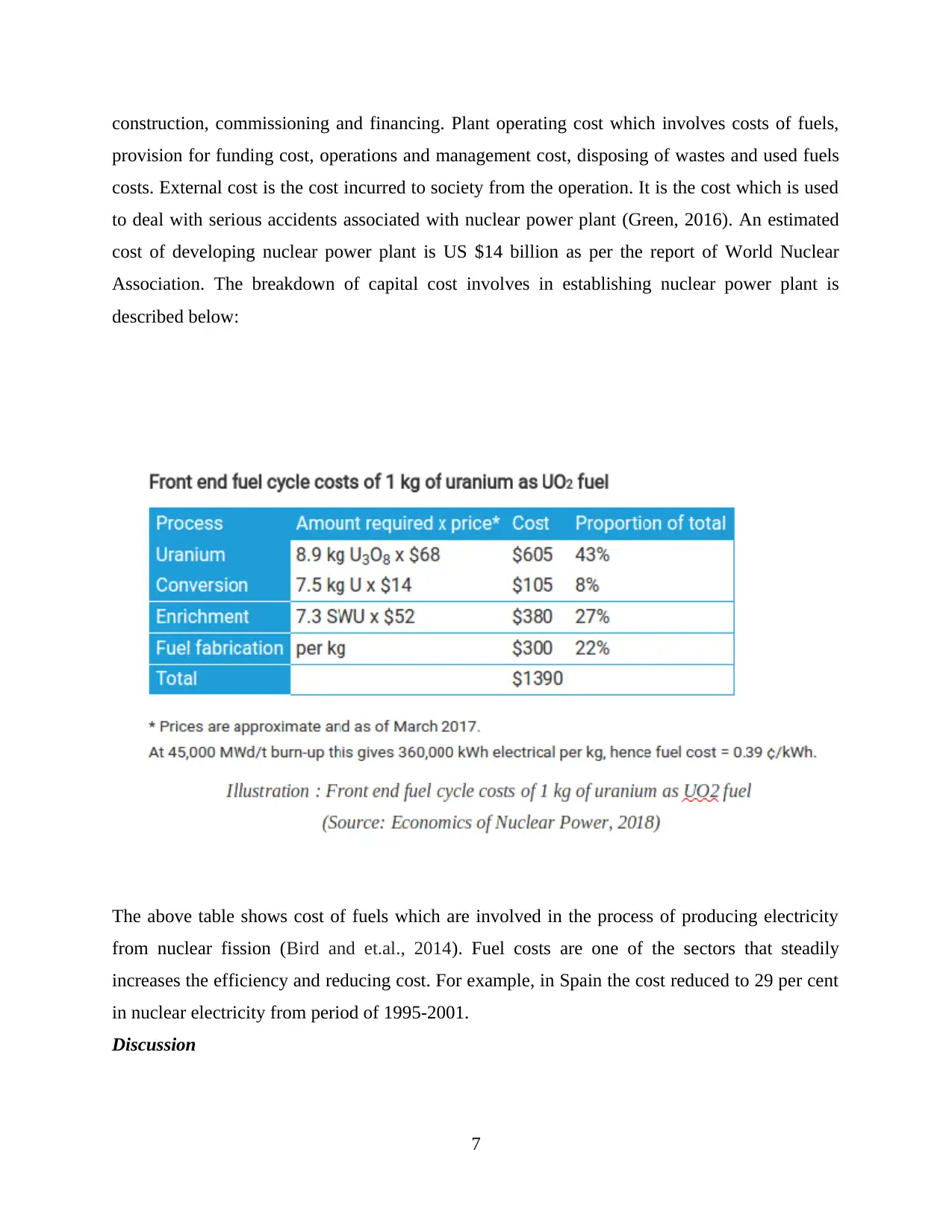
construction, commissioning and financing. Plant operating cost which involves costs of fuels,
provision for funding cost, operations and management cost, disposing of wastes and used fuels
costs. External cost is the cost incurred to society from the operation. It is the cost which is used
to deal with serious accidents associated with nuclear power plant (Green, 2016). An estimated
cost of developing nuclear power plant is US $14 billion as per the report of World Nuclear
Association. The breakdown of capital cost involves in establishing nuclear power plant is
described below:
The above table shows cost of fuels which are involved in the process of producing electricity
from nuclear fission (Bird and et.al., 2014). Fuel costs are one of the sectors that steadily
increases the efficiency and reducing cost. For example, in Spain the cost reduced to 29 per cent
in nuclear electricity from period of 1995-2001.
Discussion
7
provision for funding cost, operations and management cost, disposing of wastes and used fuels
costs. External cost is the cost incurred to society from the operation. It is the cost which is used
to deal with serious accidents associated with nuclear power plant (Green, 2016). An estimated
cost of developing nuclear power plant is US $14 billion as per the report of World Nuclear
Association. The breakdown of capital cost involves in establishing nuclear power plant is
described below:
The above table shows cost of fuels which are involved in the process of producing electricity
from nuclear fission (Bird and et.al., 2014). Fuel costs are one of the sectors that steadily
increases the efficiency and reducing cost. For example, in Spain the cost reduced to 29 per cent
in nuclear electricity from period of 1995-2001.
Discussion
7
⊘ This is a preview!⊘
Do you want full access?
Subscribe today to unlock all pages.

Trusted by 1+ million students worldwide
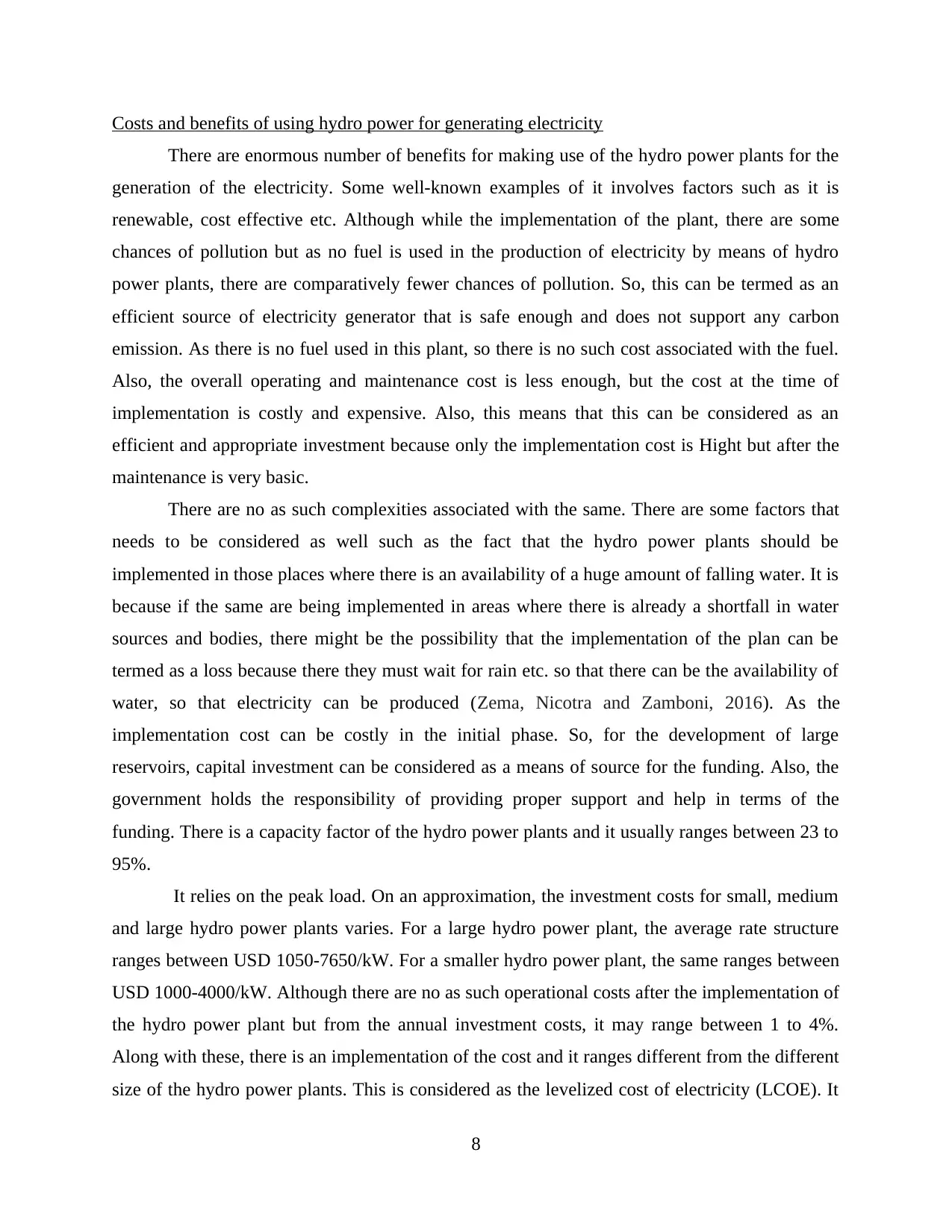
Costs and benefits of using hydro power for generating electricity
There are enormous number of benefits for making use of the hydro power plants for the
generation of the electricity. Some well-known examples of it involves factors such as it is
renewable, cost effective etc. Although while the implementation of the plant, there are some
chances of pollution but as no fuel is used in the production of electricity by means of hydro
power plants, there are comparatively fewer chances of pollution. So, this can be termed as an
efficient source of electricity generator that is safe enough and does not support any carbon
emission. As there is no fuel used in this plant, so there is no such cost associated with the fuel.
Also, the overall operating and maintenance cost is less enough, but the cost at the time of
implementation is costly and expensive. Also, this means that this can be considered as an
efficient and appropriate investment because only the implementation cost is Hight but after the
maintenance is very basic.
There are no as such complexities associated with the same. There are some factors that
needs to be considered as well such as the fact that the hydro power plants should be
implemented in those places where there is an availability of a huge amount of falling water. It is
because if the same are being implemented in areas where there is already a shortfall in water
sources and bodies, there might be the possibility that the implementation of the plan can be
termed as a loss because there they must wait for rain etc. so that there can be the availability of
water, so that electricity can be produced (Zema, Nicotra and Zamboni, 2016). As the
implementation cost can be costly in the initial phase. So, for the development of large
reservoirs, capital investment can be considered as a means of source for the funding. Also, the
government holds the responsibility of providing proper support and help in terms of the
funding. There is a capacity factor of the hydro power plants and it usually ranges between 23 to
95%.
It relies on the peak load. On an approximation, the investment costs for small, medium
and large hydro power plants varies. For a large hydro power plant, the average rate structure
ranges between USD 1050-7650/kW. For a smaller hydro power plant, the same ranges between
USD 1000-4000/kW. Although there are no as such operational costs after the implementation of
the hydro power plant but from the annual investment costs, it may range between 1 to 4%.
Along with these, there is an implementation of the cost and it ranges different from the different
size of the hydro power plants. This is considered as the levelized cost of electricity (LCOE). It
8
There are enormous number of benefits for making use of the hydro power plants for the
generation of the electricity. Some well-known examples of it involves factors such as it is
renewable, cost effective etc. Although while the implementation of the plant, there are some
chances of pollution but as no fuel is used in the production of electricity by means of hydro
power plants, there are comparatively fewer chances of pollution. So, this can be termed as an
efficient source of electricity generator that is safe enough and does not support any carbon
emission. As there is no fuel used in this plant, so there is no such cost associated with the fuel.
Also, the overall operating and maintenance cost is less enough, but the cost at the time of
implementation is costly and expensive. Also, this means that this can be considered as an
efficient and appropriate investment because only the implementation cost is Hight but after the
maintenance is very basic.
There are no as such complexities associated with the same. There are some factors that
needs to be considered as well such as the fact that the hydro power plants should be
implemented in those places where there is an availability of a huge amount of falling water. It is
because if the same are being implemented in areas where there is already a shortfall in water
sources and bodies, there might be the possibility that the implementation of the plan can be
termed as a loss because there they must wait for rain etc. so that there can be the availability of
water, so that electricity can be produced (Zema, Nicotra and Zamboni, 2016). As the
implementation cost can be costly in the initial phase. So, for the development of large
reservoirs, capital investment can be considered as a means of source for the funding. Also, the
government holds the responsibility of providing proper support and help in terms of the
funding. There is a capacity factor of the hydro power plants and it usually ranges between 23 to
95%.
It relies on the peak load. On an approximation, the investment costs for small, medium
and large hydro power plants varies. For a large hydro power plant, the average rate structure
ranges between USD 1050-7650/kW. For a smaller hydro power plant, the same ranges between
USD 1000-4000/kW. Although there are no as such operational costs after the implementation of
the hydro power plant but from the annual investment costs, it may range between 1 to 4%.
Along with these, there is an implementation of the cost and it ranges different from the different
size of the hydro power plants. This is considered as the levelized cost of electricity (LCOE). It
8
Paraphrase This Document
Need a fresh take? Get an instant paraphrase of this document with our AI Paraphraser
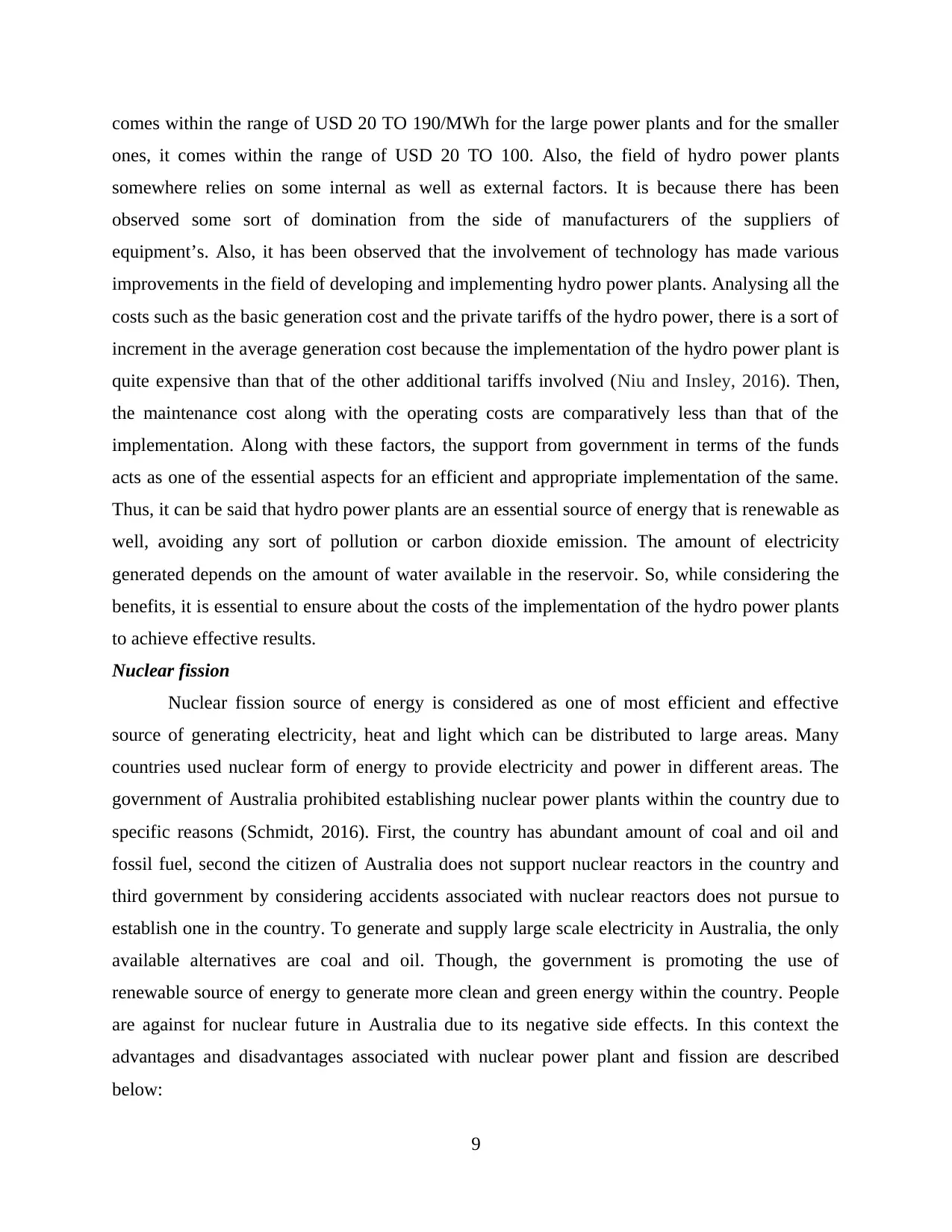
comes within the range of USD 20 TO 190/MWh for the large power plants and for the smaller
ones, it comes within the range of USD 20 TO 100. Also, the field of hydro power plants
somewhere relies on some internal as well as external factors. It is because there has been
observed some sort of domination from the side of manufacturers of the suppliers of
equipment’s. Also, it has been observed that the involvement of technology has made various
improvements in the field of developing and implementing hydro power plants. Analysing all the
costs such as the basic generation cost and the private tariffs of the hydro power, there is a sort of
increment in the average generation cost because the implementation of the hydro power plant is
quite expensive than that of the other additional tariffs involved (Niu and Insley, 2016). Then,
the maintenance cost along with the operating costs are comparatively less than that of the
implementation. Along with these factors, the support from government in terms of the funds
acts as one of the essential aspects for an efficient and appropriate implementation of the same.
Thus, it can be said that hydro power plants are an essential source of energy that is renewable as
well, avoiding any sort of pollution or carbon dioxide emission. The amount of electricity
generated depends on the amount of water available in the reservoir. So, while considering the
benefits, it is essential to ensure about the costs of the implementation of the hydro power plants
to achieve effective results.
Nuclear fission
Nuclear fission source of energy is considered as one of most efficient and effective
source of generating electricity, heat and light which can be distributed to large areas. Many
countries used nuclear form of energy to provide electricity and power in different areas. The
government of Australia prohibited establishing nuclear power plants within the country due to
specific reasons (Schmidt, 2016). First, the country has abundant amount of coal and oil and
fossil fuel, second the citizen of Australia does not support nuclear reactors in the country and
third government by considering accidents associated with nuclear reactors does not pursue to
establish one in the country. To generate and supply large scale electricity in Australia, the only
available alternatives are coal and oil. Though, the government is promoting the use of
renewable source of energy to generate more clean and green energy within the country. People
are against for nuclear future in Australia due to its negative side effects. In this context the
advantages and disadvantages associated with nuclear power plant and fission are described
below:
9
ones, it comes within the range of USD 20 TO 100. Also, the field of hydro power plants
somewhere relies on some internal as well as external factors. It is because there has been
observed some sort of domination from the side of manufacturers of the suppliers of
equipment’s. Also, it has been observed that the involvement of technology has made various
improvements in the field of developing and implementing hydro power plants. Analysing all the
costs such as the basic generation cost and the private tariffs of the hydro power, there is a sort of
increment in the average generation cost because the implementation of the hydro power plant is
quite expensive than that of the other additional tariffs involved (Niu and Insley, 2016). Then,
the maintenance cost along with the operating costs are comparatively less than that of the
implementation. Along with these factors, the support from government in terms of the funds
acts as one of the essential aspects for an efficient and appropriate implementation of the same.
Thus, it can be said that hydro power plants are an essential source of energy that is renewable as
well, avoiding any sort of pollution or carbon dioxide emission. The amount of electricity
generated depends on the amount of water available in the reservoir. So, while considering the
benefits, it is essential to ensure about the costs of the implementation of the hydro power plants
to achieve effective results.
Nuclear fission
Nuclear fission source of energy is considered as one of most efficient and effective
source of generating electricity, heat and light which can be distributed to large areas. Many
countries used nuclear form of energy to provide electricity and power in different areas. The
government of Australia prohibited establishing nuclear power plants within the country due to
specific reasons (Schmidt, 2016). First, the country has abundant amount of coal and oil and
fossil fuel, second the citizen of Australia does not support nuclear reactors in the country and
third government by considering accidents associated with nuclear reactors does not pursue to
establish one in the country. To generate and supply large scale electricity in Australia, the only
available alternatives are coal and oil. Though, the government is promoting the use of
renewable source of energy to generate more clean and green energy within the country. People
are against for nuclear future in Australia due to its negative side effects. In this context the
advantages and disadvantages associated with nuclear power plant and fission are described
below:
9
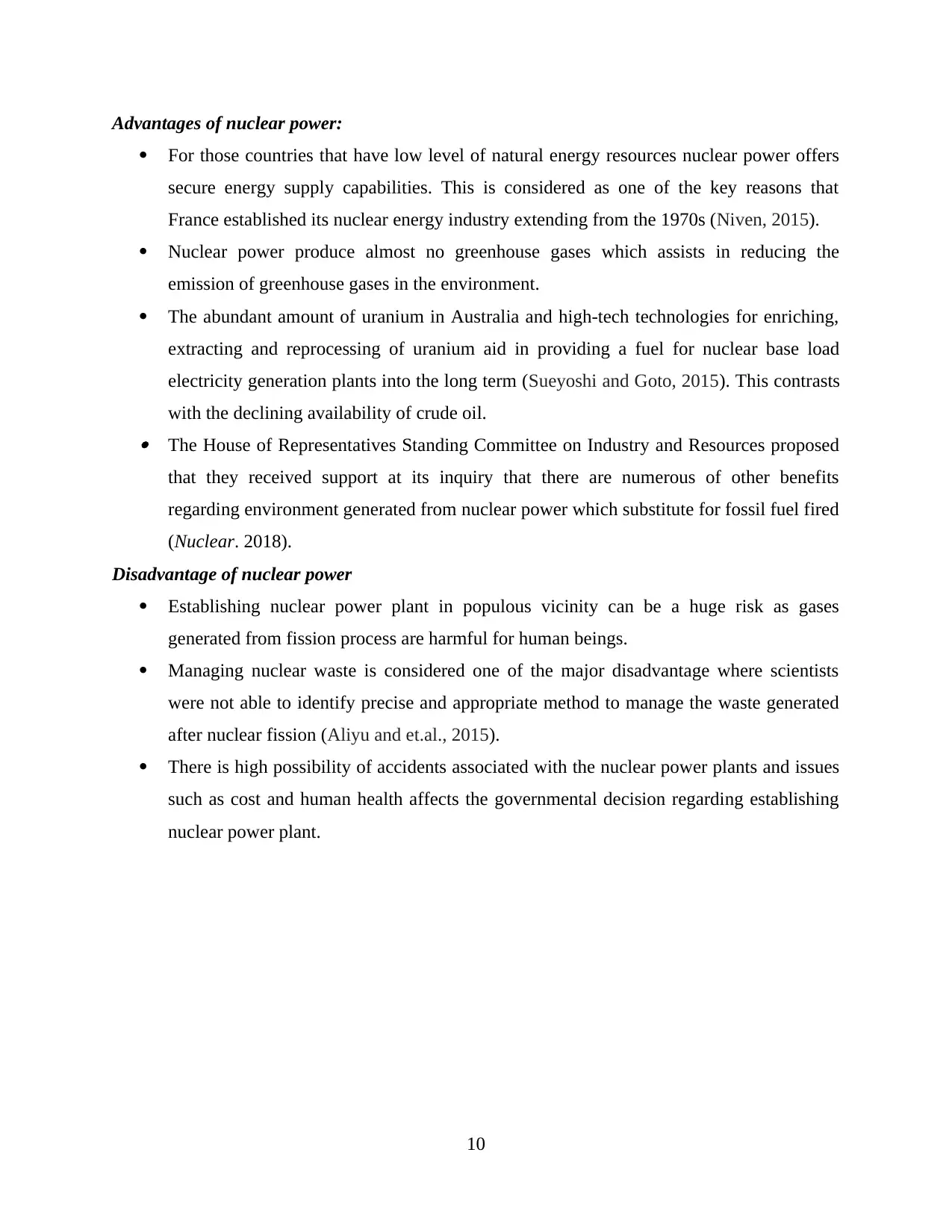
Advantages of nuclear power:
For those countries that have low level of natural energy resources nuclear power offers
secure energy supply capabilities. This is considered as one of the key reasons that
France established its nuclear energy industry extending from the 1970s (Niven, 2015).
Nuclear power produce almost no greenhouse gases which assists in reducing the
emission of greenhouse gases in the environment.
The abundant amount of uranium in Australia and high-tech technologies for enriching,
extracting and reprocessing of uranium aid in providing a fuel for nuclear base load
electricity generation plants into the long term (Sueyoshi and Goto, 2015). This contrasts
with the declining availability of crude oil. The House of Representatives Standing Committee on Industry and Resources proposed
that they received support at its inquiry that there are numerous of other benefits
regarding environment generated from nuclear power which substitute for fossil fuel fired
(Nuclear. 2018).
Disadvantage of nuclear power
Establishing nuclear power plant in populous vicinity can be a huge risk as gases
generated from fission process are harmful for human beings.
Managing nuclear waste is considered one of the major disadvantage where scientists
were not able to identify precise and appropriate method to manage the waste generated
after nuclear fission (Aliyu and et.al., 2015).
There is high possibility of accidents associated with the nuclear power plants and issues
such as cost and human health affects the governmental decision regarding establishing
nuclear power plant.
10
For those countries that have low level of natural energy resources nuclear power offers
secure energy supply capabilities. This is considered as one of the key reasons that
France established its nuclear energy industry extending from the 1970s (Niven, 2015).
Nuclear power produce almost no greenhouse gases which assists in reducing the
emission of greenhouse gases in the environment.
The abundant amount of uranium in Australia and high-tech technologies for enriching,
extracting and reprocessing of uranium aid in providing a fuel for nuclear base load
electricity generation plants into the long term (Sueyoshi and Goto, 2015). This contrasts
with the declining availability of crude oil. The House of Representatives Standing Committee on Industry and Resources proposed
that they received support at its inquiry that there are numerous of other benefits
regarding environment generated from nuclear power which substitute for fossil fuel fired
(Nuclear. 2018).
Disadvantage of nuclear power
Establishing nuclear power plant in populous vicinity can be a huge risk as gases
generated from fission process are harmful for human beings.
Managing nuclear waste is considered one of the major disadvantage where scientists
were not able to identify precise and appropriate method to manage the waste generated
after nuclear fission (Aliyu and et.al., 2015).
There is high possibility of accidents associated with the nuclear power plants and issues
such as cost and human health affects the governmental decision regarding establishing
nuclear power plant.
10
⊘ This is a preview!⊘
Do you want full access?
Subscribe today to unlock all pages.

Trusted by 1+ million students worldwide
1 out of 15
Related Documents
Your All-in-One AI-Powered Toolkit for Academic Success.
+13062052269
info@desklib.com
Available 24*7 on WhatsApp / Email
![[object Object]](/_next/static/media/star-bottom.7253800d.svg)
Unlock your academic potential
Copyright © 2020–2026 A2Z Services. All Rights Reserved. Developed and managed by ZUCOL.





